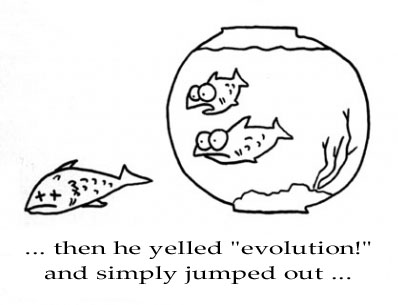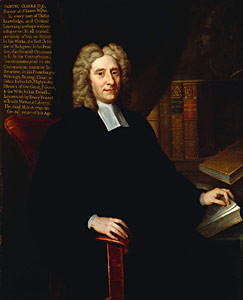 Last time I talked about Dallas Willard. This time, another great Christian thinker, who I discovered some time around 1998.
Last time I talked about Dallas Willard. This time, another great Christian thinker, who I discovered some time around 1998.
Samuel Clarke (1675-1729) was one of the all-time great philosophical theologians. He was a greatly respected Anglican minister, and probably would have become archbishop of Canterbury if he hadn’t published on the Trinity. He was a younger friend of the famous scientist Isaac Newton, and became the main expositor of Newton’s science and the metaphysics and theology underlying it. He was also a talented metaphysician and an impressively learned scholar, capable of wielding a thousand textual facts to mount an argument.
 In 1705 Clarke became famous for his still studied classic, A Demonstration of the Being and Attributes of God (old edition). This is a big, developed presentation of a cosmological argument for the existence of exactly one “necessary” and perfect being. In my view, it is not entirely successful, but it is impressive, and the most developed cosmological argument ever, at least before very recently. Leading philosopher of religion Dr. William Rowe wrote an excellent book on Clarke’s Demonstration.
In 1705 Clarke became famous for his still studied classic, A Demonstration of the Being and Attributes of God (old edition). This is a big, developed presentation of a cosmological argument for the existence of exactly one “necessary” and perfect being. In my view, it is not entirely successful, but it is impressive, and the most developed cosmological argument ever, at least before very recently. Leading philosopher of religion Dr. William Rowe wrote an excellent book on Clarke’s Demonstration.
For whatever reasons, though probably in part, his interactions with his friends Newton and William Whiston, Clarke plunged into the Bible and patristics, and came up with finely honed views on the Trinity, along the lines of the early (c. 150-350) “fathers.” This he published in his Scripture Doctrine of the Trinity, the first edition of which was in 1712. This is his other, neglected, lost classic. It created quite a stir in early 18th c. England. Clarke narrowly avoided losing his job over the controversy. But here I’ll stick to its effect on my thinking.
In the first 35 pages, Clarke lays out some 441 passages in the NT, in which the Father either “is stiled the one or only God” (1), or “wherein he is stiled ‘God’ absolutely, by way of eminence and supremacy” (6), or “wherein he is stiled ‘God’ with some peculiar high titles, epithets, or attributes; which… are (generally, if not) always by way of supreme eminence, ascribed to the person of the Father only” (24). (In this post I’ve modernized Clarke’s words, omitting his early 18th c. use of italics and capitalization.)
After examining all passages concerning the Son and Spirit, and how they related to the Father, as well as all mentions of Father, Son, and Spirit together, Clarke gets theological. There’s a lot I could say about this, but in brief,
There is one supreme cause… of all things [i.e. the Father]; one simple, uncompounded, undivided, intelligent agent, or person; who is the alone author of all being, and the fountain of all power. (122)
And appealing to some 45 NT texts, he asserts that
The Father alone, is, absolutely speaking, the God of the universe; the God of Abraham, Isaac and Jacob; the God of Israel; of Moses, of the Prophets and Apostles; and the God and Father of our Lord Jesus Christ.
He defends all these claims by quoting (in the original language, then translating) numerous church fathers, especially Athanasius, Novation, Origen, Justin, and Tertullian. In short, he believes in 3 divine persons, but only one, the Father is autotheos – divine through or because of himself. This one, is the one God of whom the OT speaks, i.e. Yahweh.
A controversy ensued, and dozens of books or pamphlets were written against Clarke. In a most manly fashion, without yielding an inch, and yet without ungodly nastiness, he defends his ideas against all comers – people I would call mysterians, three-self trinitarians, one-self trinitarians, and humanitarian unitarians (“Socinians”) – who, interestingly, he takes to be basically one-self trinitarians. He does this in nine thick follow up pieces (also in here), responses to those few of his many critics Clarke thought worthy of an answer.
This was all a lot to digest. But the main effect all this had on me was to drive me back to the New Testament, to see if what Clarke says about it is true. I found that all the New Testament authors very clearly assume a distinction between God, a.k.a. the Father, and Jesus. With a few exceptions, “God” refers to the Father, and generally in Paul, “the Lord” is Jesus. (This last can be confusing to us, because we’ve long used “Lord” or “LORD” to translate “Yahweh”.) But what could hardly be clearer is that Father and Son there are different selves. But then, they’re different beings; a self just is a certain sort of being. Clarke also shows that for just about any favorite proof text supposedly showing that Jesus “is God,” in the immediate context, we find that the author seems to assume them to be two.
Now the standard answer to Clarke’s point that Father and Son are different selves is this: Sure, they are two persons, but that’s compatible with their being one God.
But Clarke explodes this defense numerous times. A “god” in the Bible is always a self – not a mere substance, nature, group, or whatnot. Thus, if Father and Son were the same god, they’d also be the same self, which Clarke would explain, is unacceptable modalism, and just makes nonsense of the New Testament. Just to take one point, the Son can’t be the same person he mediates for – if he’s the mediator between God and man (which the NT says he is), then that precludes his being the same self as God. Further, if you think that “sharing a substance” (whatever that amounts to) makes them one god, you need to say why it is that two gods couldn’t share one substance – and Clarke bets that you can’t show this. Keep in mind that he agrees with the claim of Nicea (325) that Father and Son are homoousios – but he argues that we should accept just the original meaning, which is, essentially, that the two are similar, i.e. both divine. Indeed, that very document assumes them to differ, and so to not be numerically identical. (So, not one self, and not one god – for in either case, they would have to be numerically identical.) It is a mistake to think that trinitarianism began at Nicea; there is no tripersonal God proclaimed in the 325 creed.
Next time: critically thinking about Clarke on the Trinity.

Pingback: Congratulations to Dale Tuggy on 100 Trinities podcast episodes | Cognitive Resonance
When did “Trinitarianism” begin?
Latter portion of the 4th c.
Can you elaborate? I just checked the wikipedia entry highlighting the changes from Nicaea to Constantinople, and neither speak explicitly of the tripersonal God. Is it the extended description of the Holy Spirit that gives you this impression? This is a fascinating distinction you bring to light here!
Good review, Dale. Keep up the good work. Forgotten men like Samuel Clark need to be made known.
Comments are closed.